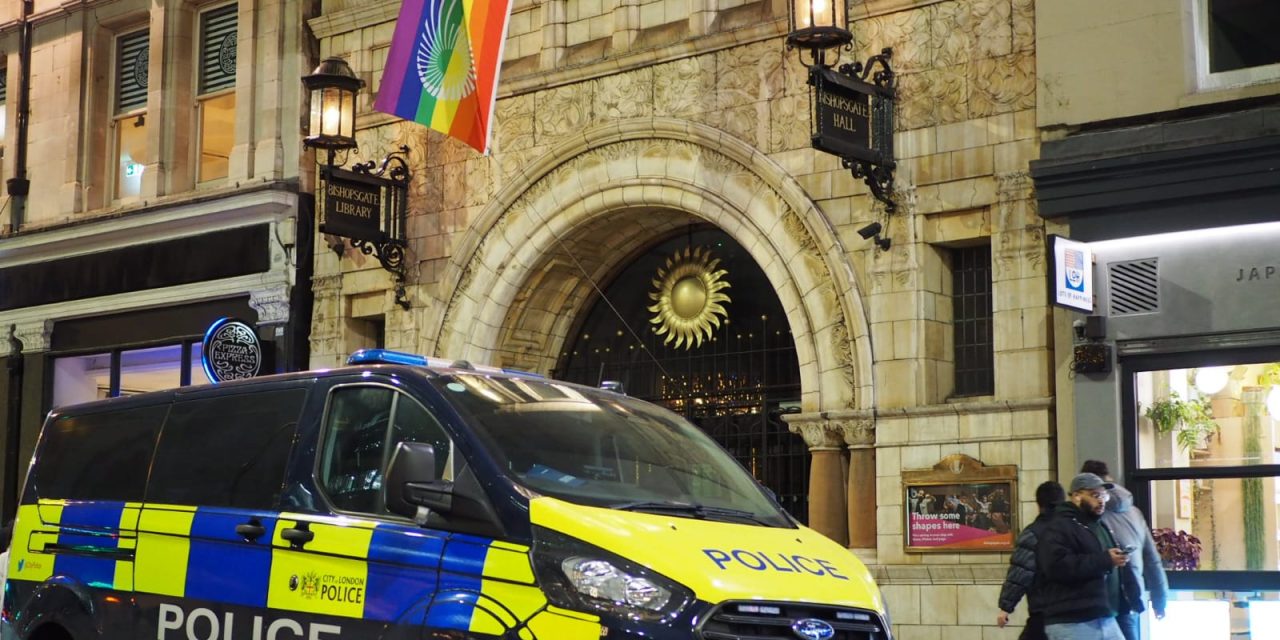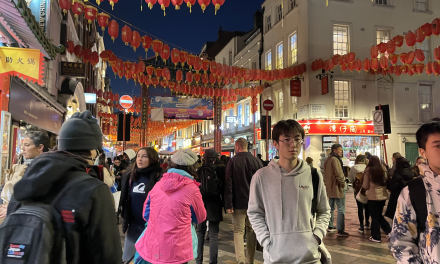London is known worldwide as a big metropolitan city, progressive and accepting. But members of the LGBTQ+ community are feeling more and more scared with hate crimes rising and a prime minister giving anti trans speeches. How is the conservative red and police blue poisoning the purple heart of London?
When homosexuality was decriminalized in 1967, UK’s queer community cheered, but before that, SoHo, an area in central London, was the place to escape for queer people in London in the 1920s and 30s. Here, multiple clubs welcomed and accepted people of all sexualities and identities, offering private chambers for folks to be who they want to be. Having a reputation, these clubs were heavily policed and shut down, but the community persevered; if one club was closed, another one simply popped up around the corner.
After World War 2, when London rebuilt itself again, the queer community did too. More clubs were being established in SoHo and other parts of central London, where they, after 1967, could finally celebrate their right to love, leading all the way to London’s first-ever official pride parade in 1992 that started a European wide yearly celebration called Europride.
It’s no surprise that tourists from all over the world travel to London, excited to enjoy the gay culture. Google is full of sites offering guides telling you where to go, what to see when gay and in London, and when walking through the city, the city’s support for the LGBTQ+ is not to be forgotten. Rainbow flags are hung outside of restaurants and shops, queer-friendly commercials, and even multiple traffic lights show their allyship with the usual walking figure swapped with same-sex or other sex symbols.
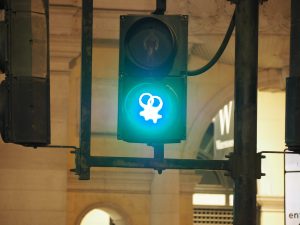
Nothing is what it seems
But as the ‘ordinary’ tourist roams through the city or as the Londoner office temp comes home from working over hours, a different reality is being lived by people like Dominic Murray, a gay black man living in the borough of Hackney. He shoves the sparkly outfit he wore just minutes before in the gay club into his backpack and holds his head down on his way home. Not at the other end of the city, but on the same metro the temp takes and the same street the tourist walks.
“Central London is a lot less gay-friendly than you might think…” Dominic Murray, aged 20, explains. Dominic identifies as queer, as gay, and has lived in London his entire life. For the first 18 years of his life, he lived on the outskirts, but as he started studying at Central Saints Martin University three years ago, he moved to the inner London neighborhood called Hackney. Central London has always been seen as progressive, especially compared to its outskirts like many other big cities, but nothing is as it seems: “…all the times I’ve actually had incidents of harassment or homophobia, I’ve always been in central, even in Hackney. Like when I did my own club night, I think it was two months ago. Anyways, I was wearing practically nothing, but I did have a spare change of a T-shirt, jeans, and trainers for the way home because I did not want to be traveling home alone from central London because that specific area is just not safe, there’s lots of danger.”
Distrusting the blue
And Dominic is not the only one who feels like this. Four out of five respondents to a survey from London TravelWatch said they changed their behaviour when out, to not attract attention going between locations. This fear is not unwarranted; since last August, the queer community gets
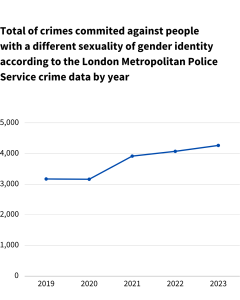 continued to be shaken up by news of a stabbing of two men outside of a gay club, assault at bus stops, in busses, in trains, and this does not even include the 11% raise in hate crime targeted towards transgendered people in England and Wales.
continued to be shaken up by news of a stabbing of two men outside of a gay club, assault at bus stops, in busses, in trains, and this does not even include the 11% raise in hate crime targeted towards transgendered people in England and Wales.
According to the London Metropolitan Police Service monthly crime data, 4262 hate crimes against the LGBTQ+ community were reported in 2023, a 4,7% raise in comparison to the 4070 in 2022. The rising hate crime rates, added onto the compiling reports of people being assaulted on public transportation and then being told to ‘not bother reporting it’ like Ash Morgan, has negatively impacted the trust between the LGBTQ+ community and the blue.
This lack of trust in the police has led to major changes within London’s gay scene, the gay village being pushed into a corner. On the 10th of December 2023, G-A-Y Late, sister bar to Europe’s largest gay disco club Heaven, closed its doors due to issues created by the pandemic and safety issues. “As a result of sometimes being the only venue open late at night in the surrounding area it has led to customers and staff being attacked on their way to and from the venue…” Jeremy Joseph, owner of Heaven, explains “…Despite so many attempts to get police to visit and support G-A-Y Late, there are no regular checks on the venues.”
So as venues close due to a lack of policing, the feeling that the police can help gets smaller and smaller. Dominic backs this claim up with experience from his friends who personally have been physically attacked on their way home from heaven. They (Dominic and his friends) belief there’s just not enough protection from the police because they just don’t care. That it’s so normalised, it has lead to a ‘why should I waste my time with this?’ additude.
But according to Detective Chief Superintendent Paul Furnell, Head of Crime and Public Protection, tackling hate crime is, in fact, a priority that the police wants to tackle. “Everyone has a right to travel without fear and no one should be subjected to violence or harassment because of who they are. (…) We work closely with LGBT charities and the community to ensure that we understand the issues that they face and can take proactive steps to prevent hate crimes.” I got in contact with their media relations officer, Jacob Collick. But when confronted with the question what concrete plans there are to win the trust back, and how it has even led to the point where queer people have lost their faith in the police as their websites states that ‘Tackling hatecrime and supporting those that feel vulnerable to victimisation’ is one of their main focus points longer than the superintendent’s quote is old, I simply got referred to the superintendent’s quote, avoiding directly answering the questions.
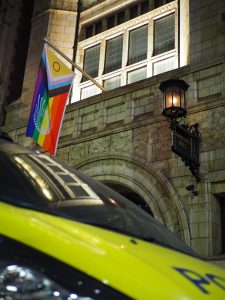
However, the lack of active policing in these situations are not only attributed to a quote-on-quote ‘lack of care’ but also a lack of funding. Scotland Yard warns for a £250million gap in funding next year because of rising demand and change in crime patterns.
13 years of Tory red
For more than 13 years, the Conservatives, the Tories, have been in power in the UK. In those 13 years, the government is believed to have cut the direct government funding to police by £3.6 billion, aka 33.7%, albeit it nationwide, according to figures of the National Police Chiefs Council. This has inadvertadly influenced the officers available on the streets, influencing the problems we have discussed prior, but this is not the only way the government is influencing the people and their trust.
“I think it’s important to keep in mind what the political situation is…” says Shadow, 23, a guide at the Queer Britain museum, the UK’s first national LGTBQ+ museum, dedicated to teach the UK’s queer history for free. She goes on to explain in short about a new ‘anti trans’ proposal, which more of can be read here, but later on she says the following: “…Looking at those bigger political issues is very important because they do trickle down into your into daily life.”
Earlier, we saw queer hate crime in London rising after 2020, the year of lockdowns with everyone being stuck at home, clustered to their phones, extreme political opinions spewed from all sides at all times. This may have influenced the behaviour and acceptance of Londoners as London is the political heart of the country, one which is as of this moment, conservative. According to the UK’s Home Office themselves: “Transgender issues have been heavily discussed by politicians, the media and on social media over the last year, which may have led to an increase in these offences, or more awareness in the police in the identification and recording of these crimes.” This comes after Prime Minister Rishi Sunak spoke at an annual conference of Conservatives. There he claimed that the UK shouldn’t get “Bullied into believing that people can be any sex they want to be — they can’t. (…) A man is a man and a woman is a woman. That’s just common sense.”
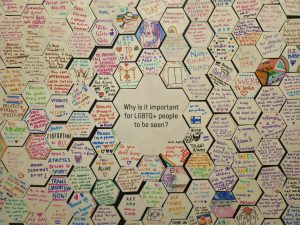 A 7 coloured future
A 7 coloured future
While people like Dominic still feel threatened, the queer community is known for it perseverance throughout the decades and even centuries. And while it may seem London is living in a time of ignorance, Shadow from Queer Britain beliefs it’s moving into the right direction: “I have had some really moving conversations with people who have learned a lot about a part of history they didn’t know about, and also a lot of parents or family members of people who are part of the queer community who come away with a lot more understanding for their children or loved ones. And yeah, it’s very heartwarming.”
“The future is unpredictable,…” Dominic says as our conversation comes to a close. “…but I’m hopeful. It feels like there’s always something that pops up out of nowhere and it just changes the entire landscape. Progress is never linear, but I think something is bound to change. I think if remain hopeful, then that change will be for the better.”
